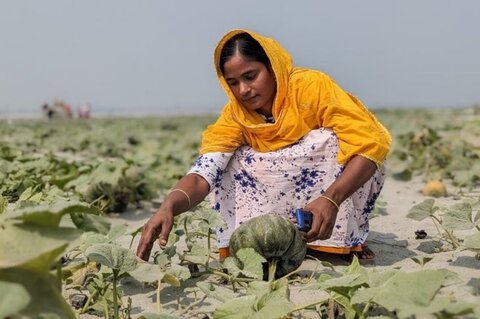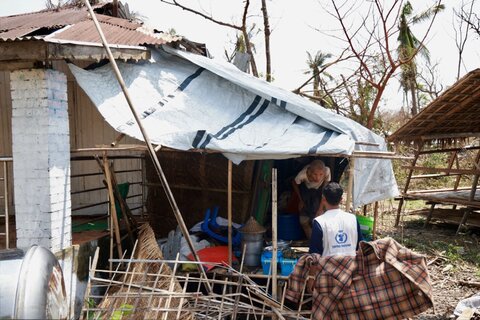Bangladesh: Supermarket shopping in the world’s biggest refugee camp

While millions around the world are slowly rousing themselves from their holiday haze, shops operating World Food Programme (WFP) Assistance Cards in Kutupalong, Cox's Bazaar — the world's largest refugee camp — are bustling. It's no wonder, considering almost 800,000 people (88% of the refugee population) shop there each month using electronic vouchers.
WFP has been transitioning from in-kind distributions of rice, lentils and oil to voucher-card stores which create a supermarket shopping experience. Families can buy their staples, fresh produce and proteins such as eggs, chicken and fish using a WFP Assistance Card, prepaid to US$12 per person per month.
‘I've never shopped like this before but I am happy because I can buy many things with this'
There are 36 shops in 17 "e-voucher" outlets across the network of camps, all bustling with energy — in one in particular the excitement is palpable. It's the first time in two years families queuing here have has access to such a wide array of produce during food distributions.
Ramida is the first shopper through the door at WFP's newly opened stores which will serve 50,000 people every month. As staffers read to her the list of foods she can choose from, a smile spreads across her face. She stocks up on dried fish, fruit, vegetables, spices, eggs, as well as staples such as rice, flour, sugar and oil.

"I will cook a fish and egg curry for dinner tonight," she explains. "We'll eat the fruits which my daughter will be very excited about." Pointing to her card, Ramida adds: "I have never shopped like this before but I am happy because I can buy many things with this."
The opening of this particular shop was made possible with funding from the Asian Development Bank (ADB) and support from the Government of Bangladesh which handed it over to WFP last month — three similar outlets have also since been opened.

"WFP has been scaling up its electronic-voucher response in the refugee camps and this outlet has helped us make significant progress towards ensuring that all refugees are receiving food via e-vouchers by the end of 2020," says Zeff Kapoor, Acting Emergency Coordinator for WFP in Cox's Bazar.
Kapoor adds: "Three more ADB-funded outlets have been built and opened which go even further in providing nutritious and comprehensive food assistance in these refugee camps."
For many people around the world, the experience of shopping is one they take for granted. Families living in this refugee camp, however, find choice is a privilege that's been taken away from them. The voucher-card outlets create options in the foods families can eat and offer a small taste of home.
Since this story was first published the COVID-19 pandemic has reached the camps. Much like other supermarkets around the world, preventative COVID-19 measures have been introduced at the e-voucher outlets which you can read about here.
The e-voucher food assistance programme is funded by USAID, EU Humanitarian Aid, Canada, Germany, UKAID, Australian Aid, Japan and The Netherlands.


